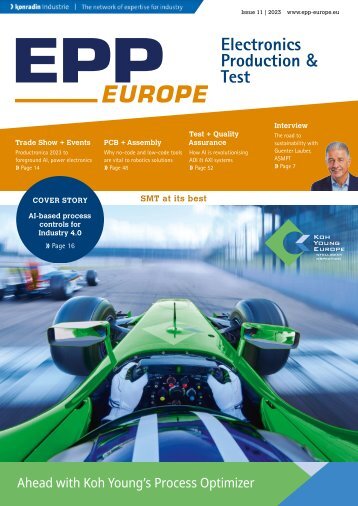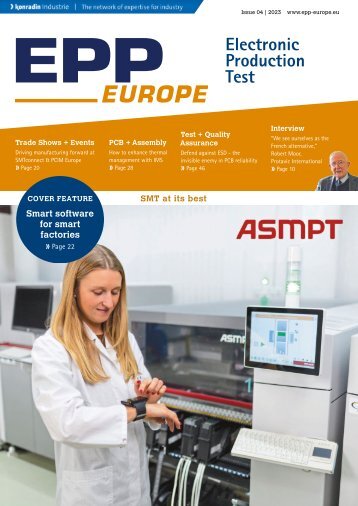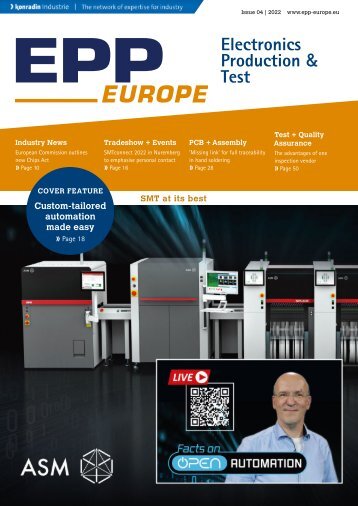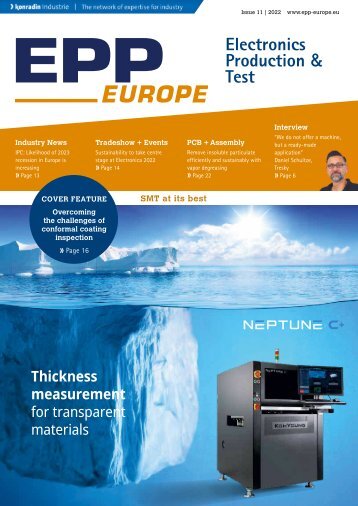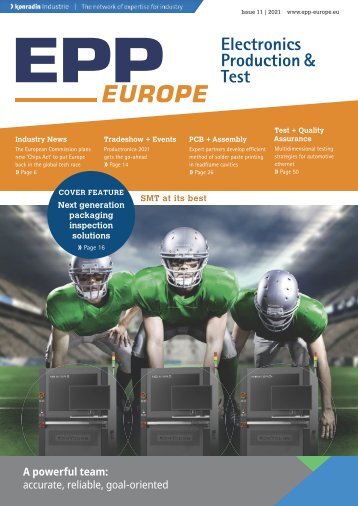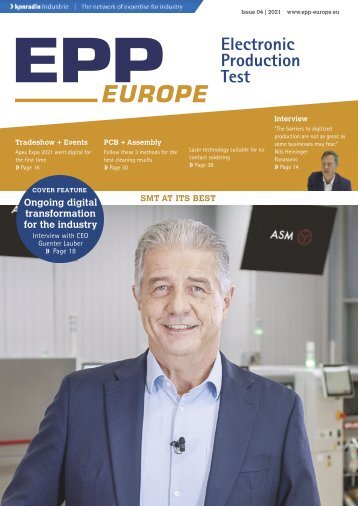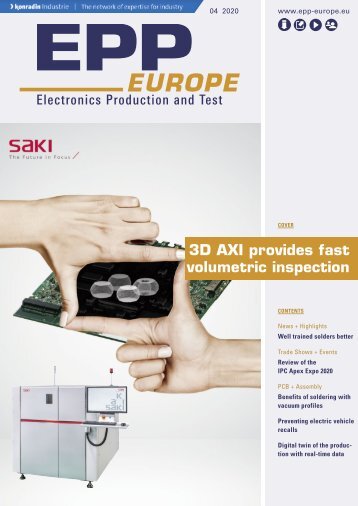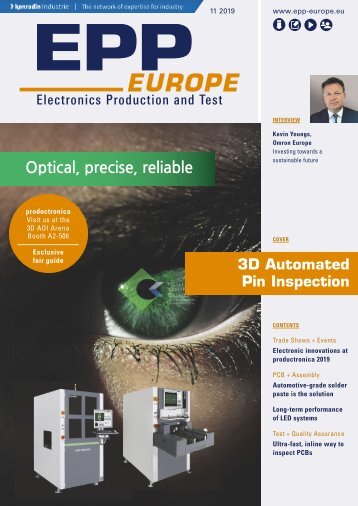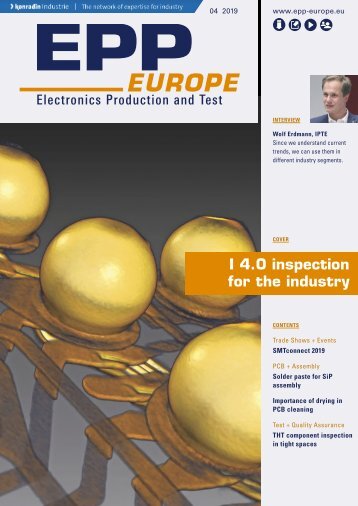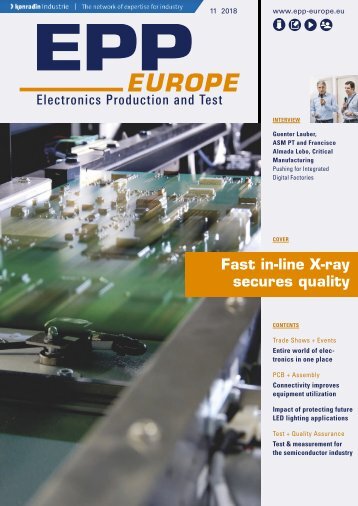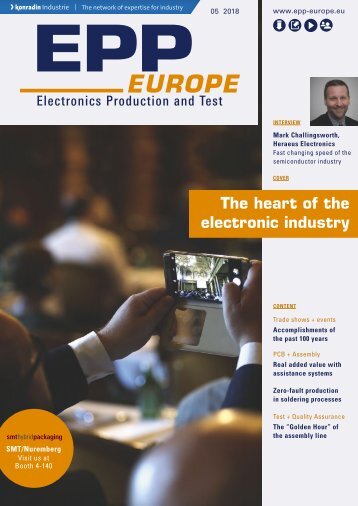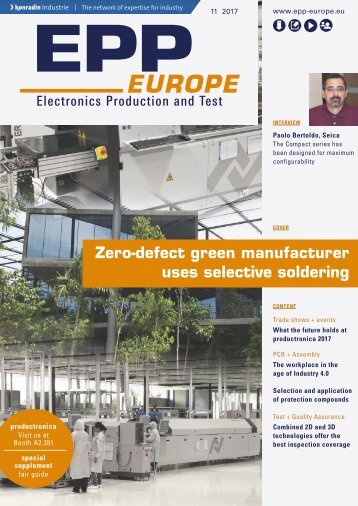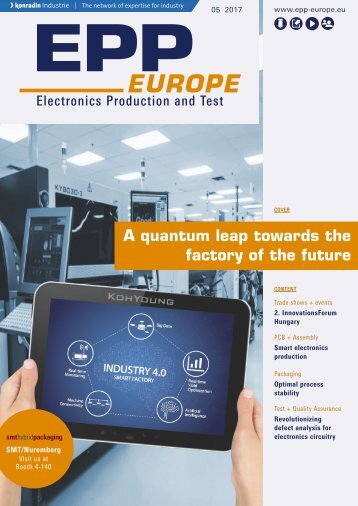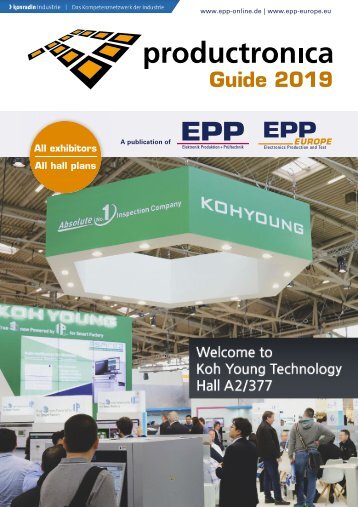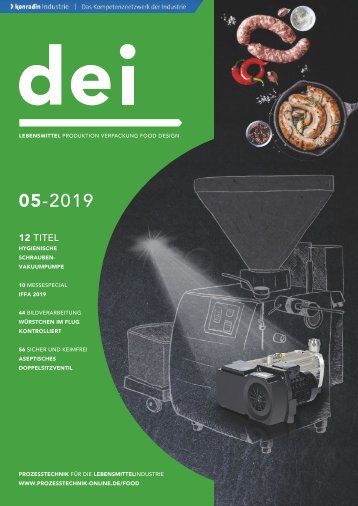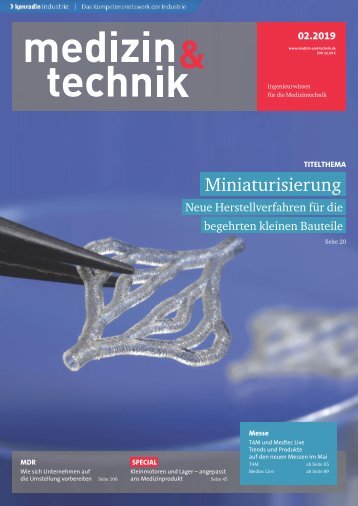EPP Europe P1.2022
- Text
- Processes
- Solder
- Automation
- Solutions
- Software
- Inspection
- Assembly
- Electronics
- Manufacturing
- Soldering
» TEST & QUALITY
» TEST & QUALITY ASSURANCE The TQ-Group headquarters at Gut Delling, near Seefeld, houses development, production, the customer center and administration Source: TQ 3D inspection systems Safe and stable SMT assembly for all shapes and sizes German electronics solutions provider the TQ-Group reveals how it has invested in state-of-the-art 3D inspection systems to future-proof its manufacturing processes and ensure it delivers products of the highest quality – no matter how complex or minute the assembly. Trends towards the miniaturization, increased complexity and better customization of assemblies is placing ever higher demands on electronics manufacturers. As one of the largest technology service providers and electronics specialists in Germany, system provider TQ Group says it offers customers reliable solutions based on the latest manufacturing technology. The company is now further futureproofing its solutions by adding the newest 3D inspection systems for SMT production from Saki Corporation to its portfolio. TQ-Group was founded in 1994 by Detlef Schneider and Rüdiger Stahl. Thanks to consistent growth and wise investments, the Group now comprises around 1,700 employees in 15 locations – 11 of which are in Germany. Its headquarters, located in Gut Delling in Seefeld, just West of Munich, currently house around 500 employees and comprise the Group’s strategic decision-making centre. At €284 million for the financial year 2020/21, the annual turnover of the owner-managed business speaks for itself. The company’s German branches include sales, production and development departments to support specialist requirements, all broadly positioned in the Electronic Engineering Manufacturing Services (E²MS) space. Augmented by a com- The TQ-Group supports its customers from 11 locations across Germany Source: TQ 54 EPP Europe » 04 | 2022
TEST & QUALITY ASSURANCE « prehensive range of in-house products such as embedded modules, base boards and drive & automation solutions, products are developed and assembled on a customer-specific basis using a proven modular process to meet specific and unique requirements. The company says the use of this proprietary modular approach to provide services and solutions reduces development times and costs. The ‘Inspection Systems’ project “Due to increasing miniaturization and complexity, combined with very different surface mount device heights, our components were no longer 100% inspectable with conventional inspection systems,” explained Werner Bäumel, Head of Production at the Delling plant. “New inspection systems were absolutely necessary. In this respect, an effective solution had to be found that would allow us to continue to supply and guarantee perfect quality to our customers.” Quality is ensured by continuous monitoring of SMT assembly processes: the only practical way to mitigate the costs and wasted time of repair and rework. Previous quality assurance procedures were designed for two-dimensional inspection operations but it was clear these were not sufficient to meet the » One of our big goals in the next five years is to make progress in terms of digitalization, for which we have created a strong foundation through the partnership with Saki « Production Manager Markus Luschnig requirements of the wide variety of assemblies being produced. “In addition, the Automatic Optical Inspection (AOI) systems at the end of each assembly line turned out to be a bottleneck over time,” pointed out Production Manager Markus Luschnig. “Through a process of careful and intensive market analysis and evaluation, we made the choice to invest in inspection systems from Saki at the end of 2020. It turned out to be a very good decision, as proven by the excellent experience we had during delivery, installation, training and commissioning – all of which were fast and without complications,” Luschnig explained. The TQ-Group’s ‘Inspection Systems’ project was founded on the proposition that all SMT assembly There are three SMD production lines at the TQ-Group‘s Delling headquarters lines within the company group should feature the same process equipment. This was to ensure company-wide consistency and a degree of redundancy for optimum flexibility between jobs and projects. “As a result, the task was more complex, as we had to find a system that could map and accommodate all the products and challenges across TQ’s plants,” Luschnig revealed. At the Delling plant, for instance, high-mix lowvolume batches of 1 to 2,000 boards are produced, whereas at the Durach plant, the number of units per batch is higher, meaning that fewer changeovers are required. One Solder Paste Inspection (SPI) system and one AOI machine were required in each of the three SMT assembly lines at the two locations. Now, one SPI and three AOI systems are inline at the Delling plant. “About two years ago, we began to take a closer look at the equipment in the SMT areas of the group of companies and decided to replace old equipment,” said Luschnig, explaining the company’s technology strategy. “The last piece of our puzzle was to decide upon suitable inspection equipment. We knew that we needed to define what suited us best and would cover our varying requirements effectively because we don’t just look to assemble electronics, we need to manufacture a system. With these systems, we also have to accommodate a high level of customization, even with quite small batch sizes,” clarified Luschnig. “In addition, one of our big goals in the next five years is to make progress in terms of digitalization, for which we have created a strong foundation through the partnership with Saki, as these inspection systems offer the very best conditions for Source: TQ EPP Europe » 04 | 2022 55
- Page 1 and 2:
Issue 04 | 2022 www.epp-europe.eu E
- Page 3 and 4: » EDITORIAL » EDITORIAL EPP/P2/20
- Page 5 and 6: 3D inspection systems: safe and sta
- Page 7 and 8: NEWS & HIGHLIGHTS « their current
- Page 9 and 10: NEWS & HIGHLIGHTS « QUALITY PIEKTR
- Page 11 and 12: Hiring announcement Indium Corporat
- Page 13 and 14: Climate change While smart light bu
- Page 15 and 16: NEWS & HIGHLIGHTS « Company news P
- Page 17 and 18: TRADE SHOWS & EVENTS « From left t
- Page 19 and 20: AT A GLANCE In this article, ASM pr
- Page 21 and 22: More than eight hours of continuous
- Page 23 and 24: With Smart Pin Placement, support p
- Page 25 and 26: PCB & ASSEMBLY « pollutants presen
- Page 27 and 28: PCB & ASSEMBLY « • Table extract
- Page 29 and 30: PCB & ASSEMBLY « The connectivity
- Page 31 and 32: PCB & ASSEMBLY « A simple operatin
- Page 33 and 34: PCB & ASSEMBLY « Ersa’s ‘Tip´
- Page 35 and 36: Product Updates « PCB & ASSEMBLY A
- Page 37 and 38: PCB & ASSEMBLY « plied only to the
- Page 39 and 40: PCB & ASSEMBLY « Plan ahead for be
- Page 41 and 42: PCB & ASSEMBLY « Scanfil technicia
- Page 43 and 44: PCB & ASSEMBLY « distribution. As
- Page 45 and 46: Beyond just storage Connecting safe
- Page 47 and 48: An illustration of mission-critical
- Page 49 and 50: In the Lynx framework, the resource
- Page 51 and 52: AME company building in Eindhoven l
- Page 53: Product Updates « TEST & QUALITY A
- Page 57 and 58: TEST & QUALITY ASSURANCE « Thanks
- Page 59 and 60: Industrie The network of expertise
Inappropriate
Loading...
Mail this publication
Loading...
Embed
Loading...

